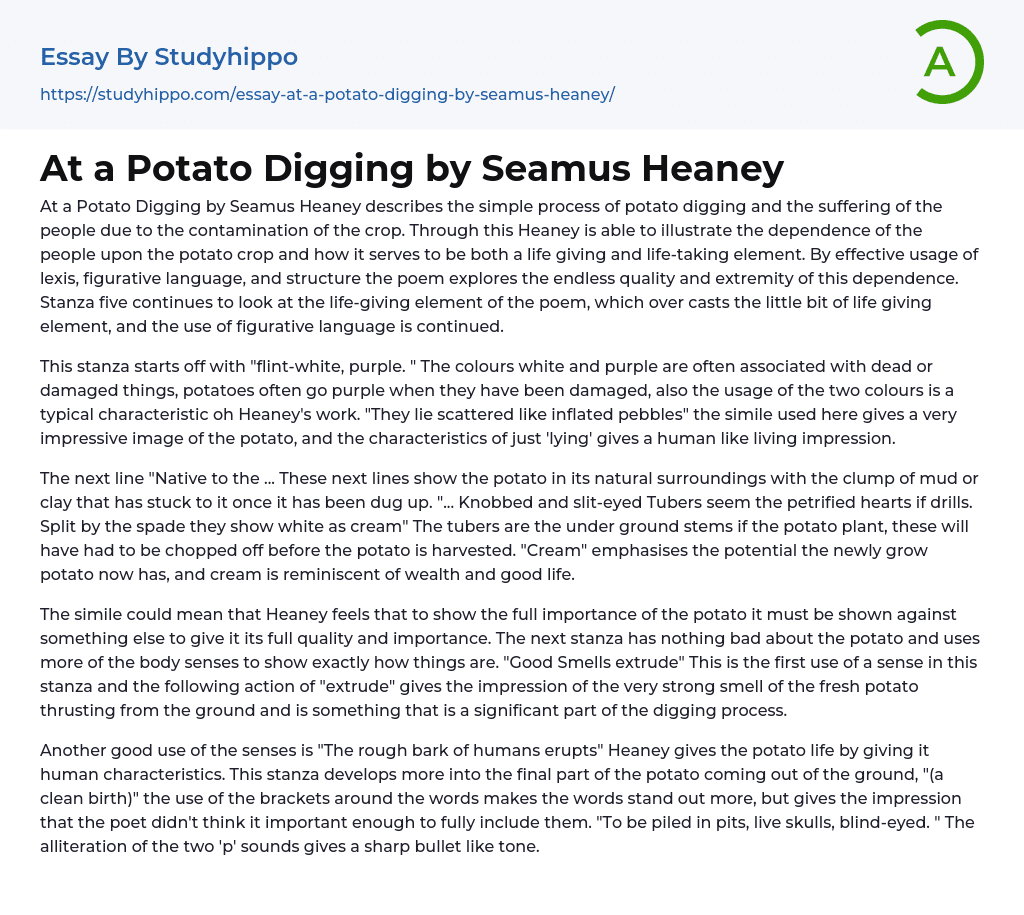At a Potato Digging by Seamus Heaney describes the simple process of potato digging and the suffering of the people due to the contamination of the crop. Through this Heaney is able to illustrate the dependence of the people upon the potato crop and how it serves to be both a life giving and life-taking element. By effective usage of lexis, figurative language, and structure the poem explores the endless quality and extremity of this dependence. Stanza five continues to look at the life-giving element of the poem, which over casts the little bit of life giving element, and the use of figurative language is continued.
This stanza starts off with "flint-white, purple. " The colours white and purple are often associated with dead or damaged things, potatoes often go purple when they have be
...en damaged, also the usage of the two colours is a typical characteristic oh Heaney's work. "They lie scattered like inflated pebbles" the simile used here gives a very impressive image of the potato, and the characteristics of just 'lying' gives a human like living impression.
The next line "Native to the ... These next lines show the potato in its natural surroundings with the clump of mud or clay that has stuck to it once it has been dug up. "... Knobbed and slit-eyed Tubers seem the petrified hearts if drills. Split by the spade they show white as cream" The tubers are the under ground stems if the potato plant, these will have had to be chopped off before the potato is harvested. "Cream" emphasises the potential the newly grow potato now has, and cream is reminiscent of wealth and good
life.
The simile could mean that Heaney feels that to show the full importance of the potato it must be shown against something else to give it its full quality and importance. The next stanza has nothing bad about the potato and uses more of the body senses to show exactly how things are. "Good Smells extrude" This is the first use of a sense in this stanza and the following action of "extrude" gives the impression of the very strong smell of the fresh potato thrusting from the ground and is something that is a significant part of the digging process.
Another good use of the senses is "The rough bark of humans erupts" Heaney gives the potato life by giving it human characteristics. This stanza develops more into the final part of the potato coming out of the ground, "(a clean birth)" the use of the brackets around the words makes the words stand out more, but gives the impression that the poet didn't think it important enough to fully include them. "To be piled in pits, live skulls, blind-eyed. " The alliteration of the two 'p' sounds gives a sharp bullet like tone.
- Aldous Huxley essays
- Alice Walker essays
- Amy tan essays
- Anne Bradstreet essays
- Anton Chekhov essays
- Arthur Miller essays
- Augustine essays
- Bertolt Brecht essays
- Booker T Washington essays
- Carol ann duffy essays
- Charles Dickens essays
- Charlotte Perkins Gilman essays
- Chinua Achebe essays
- Christina Rossetti essays
- Consider The Lobster essays
- Edgar Allan Poe essays
- Elizabeth Bishop essays
- Emily Dickinson essays
- Ernest Hemingway essays
- F. Scott Fitzgerald essays
- George Orwell essays
- Harper Lee essays
- Homer essays
- James Baldwin essays
- Jane Austen essays
- John Donne essays
- John Steinbeck essays
- Kate Chopin essays
- Kurt Vonnegut essays
- Langston Hughes essays
- Leonardo Da Vinci essays
- Mark Twain essays
- Mary Shelley essays
- Maya Angelou essays
- Nathaniel Hawthorne essays
- Oscar Wilde essays
- Percy Bysshe Shelley essays
- Peter Skrzynecki essays
- Phillis Wheatley essays
- Poets essays
- Ralph Waldo Emerson essays
- Ray Bradbury essays
- Richard Rodriguez essays
- Robert Browning essays
- Robert Frost essays
- Robert Louis Stevenson essays
- Seamus Heaney essays
- Sherman Alexie essays
- Sophocles essays
- Stephen King essays




